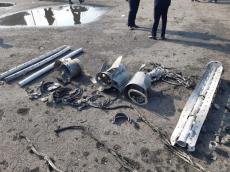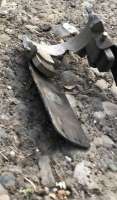|
|
TODAY.AZ / Politics
Amnesty International, Human Rights Watch confirm use of cluster munitions by Armenia
30 October 2020 [12:35] - TODAY.AZ

By Azernews
By Vafa Ismayilova
International human rights watchdogs Amnesty International and Human Rights Watch have verified the use of banned cluster bombs by Armenia in an attack on the Azerbaijani city of Barda.
In its report on October 29, 2020, Amnesty International said that its Crisis Response experts verified pictures (taken by Vice News reporters in the city) of fragments of 9N235 cluster munitions from Russian-made 9M55 Smerch rockets, that appear to have been fired at the city by Armenian forces.
On October 28, 2020, at approximately 1.30 pm local time, one or several Smerch rockets were fired into Barda, striking a residential neighbourhood close to a hospital. The Azerbaijani Prosecutor General’s Office has stated that at least 21 people were killed, with an estimated 70 more injured, Amnesty International added.
Cruel, reckless attack
“The firing of cluster munitions into civilian areas is cruel and reckless, and causes untold death, injury and misery,” said Marie Struthers, Amnesty International’s Regional Director for Eastern Europe and Central Asia.
“Cluster munitions are inherently indiscriminate weapons, and their use in any circumstances is banned under international humanitarian law,” she said urging the sides to prioritize the protection of civilians.
Amnesty International has called on all sides to the conflict to fully respect international humanitarian law and to protect civilians from the effects of hostilities.
Flagrant disregard for civilian life and international law
On October 30, Human Rights Watch said that Armenian forces either fired or supplied internationally banned cluster munitions and at least one other type of long-range rocket used in an attack on Barda city, 230 kilometres west of Azerbaijan’s capital, Baku on 28 October.
“There’s a reason these brutal weapons are banned by an international treaty, and using them in a city centre shows flagrant disregard for civilian life and international law,” said Belkis Wille, senior crisis and conflict researcher at Human Rights Watch.
He said that all countries should condemn using cluster munitions in the war over Nagorno-Karabakh.
Human Rights Watch report added that the watchdog reviewed six videos and 28 photographs taken from the scenes of the attack and shared directly with researchers, as well as posted on social media. Human Rights Watch was able to verify the locations of two of the sites attacked by matching key landmarks in the photographs and videos with satellite imagery. One of the locations confirmed was less than 100 meters from Barda Central Hospital, the city’s largest fully functioning hospital, the report added.
Standard international reference publications, including the authoritative annual Military Balance 2020 by the International Institute for Strategic Studies, do not say that Nagorno-Karabakh armed forces possess Smerch multi-barrel rocket launchers. It does say that Armenia has Tockhka and Iskander ballistic missiles and Smerch and Chinese-made WM-80 multi-barrel rocket launchers, all of which can deliver cluster munition warheads, Human Rights Watch said.
Cluster munitions
Cluster munitions are inherently indiscriminate weapons that inflict suffering for civilian population years after their use, and are internationally banned by a treaty backed by more than 100 states. Cluster munitions scatter hundreds of bomblets, or submunitions, over a wide area. It is estimated that between 5 and 20 per cent of cluster bomblets fail to explode. They are then left behind, posing a threat to civilians similar to that of anti-personnel landmines.
The use of these weapons violates the prohibition of indiscriminate attack because of the wide area covered by the numerous bomblets released, and the danger posed to all who come into contact with the unexploded munitions.
Twenty-five Azerbaijani civilians were killed in Armenia’s two separate missile attacks on Barda on October 27 and 28. Ninety-one Azerbaijani civilians have been killed in Armenia’s indiscriminate attacks on civilians since September 27.





URL: http://www.today.az/news/politics/199599.html
 Print version
Print version
Connect with us. Get latest news and updates.
See Also
- 26 January 2026 [15:15]
This blogger made inappropriate remarks about members of the Peace Council - 26 January 2026 [12:12]
Azerbaijan's Second Oil Boom: forecasts and opportunities - 26 January 2026 [10:45]
President Ilham Aliyev receives Minister of Foreign Affairs of Israel - 25 January 2026 [21:10]
Azerbaijan Defense Ministry presents review of events of last week [VIDEO] - 25 January 2026 [17:50]
Baku hosts NATO Mobile Training Team's course - 25 January 2026 [10:23]
Azerbaijani Parliament Speaker visits Bahrain for 16th APA Session - 24 January 2026 [11:40]
Trump backs peace, signals US arms sales to Azerbaijan - 24 January 2026 [09:48]
US vice president to visit Azerbaijan, Armenia, Trump says - 23 January 2026 [10:10]
Strategic dialogue between Baku and Washington - how it goes in economy - 22 January 2026 [15:54]
President Ilham Aliyev, U.S. President hold expanded meeting in Davos
Most Popular
 Moldova’s unification debate, stripped of romance
Moldova’s unification debate, stripped of romance
 Pentagon’s new strategy: Russia a “manageable threat,” China a growing challenge
Pentagon’s new strategy: Russia a “manageable threat,” China a growing challenge
 Trump names 'secret weapon' used in Venezuela
Trump names 'secret weapon' used in Venezuela
 Chinese automaker takes over Nissan’s South African plant, safeguarding jobs
Chinese automaker takes over Nissan’s South African plant, safeguarding jobs
 Nipah virus outbreak in India: What we know about West Bengal cases
Nipah virus outbreak in India: What we know about West Bengal cases
 Trump names 'secret weapon' used in Venezuela
Trump names 'secret weapon' used in Venezuela
 Exhibition 'Inspired by Czechia' opens in Baku
Exhibition 'Inspired by Czechia' opens in Baku
